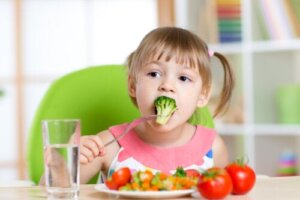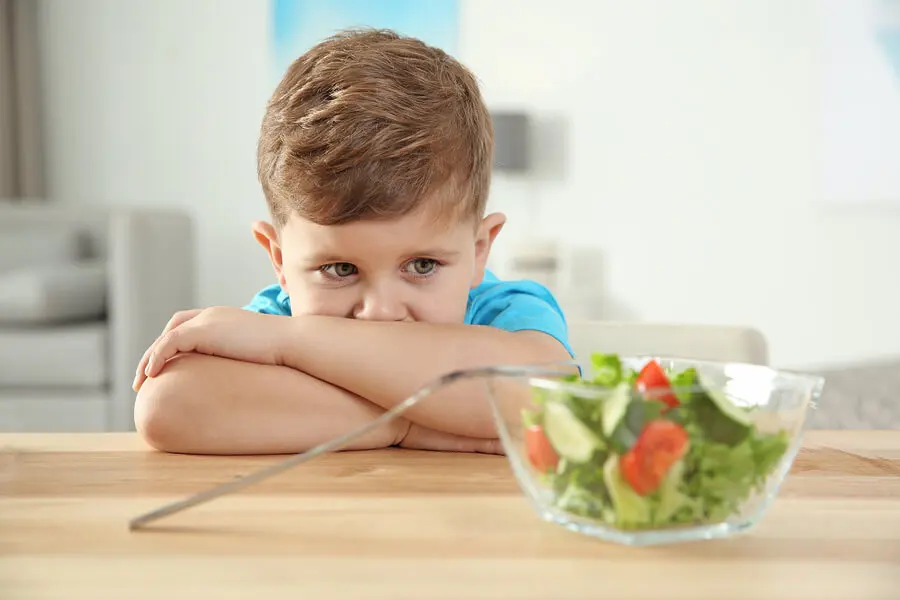A Vegetarian Diet for Children: Advantages and Disadvantages


Written and verified by the nutritionist Maria Patricia Pinero Corredor
The Argentine Society of Pediatrics points out that, with the rising popularity of vegetarianism, the use of a vegetarian diet in children has also increased. There may be many reasons for this, whether they be to promote better health, save money, respect animals, or for religious motives, among others.
In any case, it’s important that parents take into account both the type of diet and the age of the child to avoid nutritional imbalances.
In this sense, various pediatric societies around the world suggest that efforts should be made to guide and educate on the care, monitoring, and controls that should be taken in this type of nutritional approach at a young age.
The impact of a vegetarian diet on children
To assess the impact of vegetarian diets on children, different modalities should be considered. Whether or not to include foods of animal origin affects the intake of certain necessary nutrients, and there are many different varieties of vegetarian diets, including the following:
- Ovo-lactovegetarians are allowed to consume eggs, milk, and dairy products.
- Lactovegetarians are allowed to consume milk and dairy products.
- Ovo vegetarians are only allowed to consume eggs and egg derivatives as foods of animal origin.
- Strict vegetarians or vegans include only foods of vegetable origin. Other stricter types of vegetarians are raw foodists and fructarians.
Less strict forms of vegetarians occasionally include foods of animal origin, such as meats, poultry, and fish. These are the semi-vegetarians and flexi-vegetarians or flexitarians.
The American Academy of Pediatrics comments that, despite the limited evidence on the growth of children with a vegetarian diet, a pediatrician should evaluate the type of modality that parents present to him/her. Thus, the more rigorous the diet, the more vulnerable the infant will be to nutritional deficiencies.
A study by the Canadian Pediatric Society revealed that 2% of young Americans between 6 and 17 years of age follow vegetarian diets. The team of specialists concluded that, with good planning and attention to specific nutrients, a healthy diet can be maintained at any stage of growth.
However, the American Academy of Pediatrics and the German Nutrition Society do not recommend strict vegetarian diets during childhood.

We think you may also enjoy reading this article: A Vegetarian Diet for Patients with Diabetes: Tips for Planning One
The advantages of a vegetarian diet in children
The magazine The American Dietetic Association reports that there’s a positive relationship between the vegetarian or vegan diet and health in the short and medium term. Let’s take a look at some of the advantages.
Cholesterol control
A study conducted by McCarty confirmed that vegetable proteins, such as soy, promote mechanisms that regulate cholesterol synthesis and LDL receptors or bad cholesterol.
Therefore, vegetarian children tend to have lower values of total cholesterol in the blood. They also usually have a healthier weight for height than children with an animal-based diet.
It may increase longevity
A review of vegetarianism in children concluded that healthy eating at an early age may increase life expectancy by preventing certain diseases.
In addition, vegetarians tend to adopt better lifestyles over time, such as not smoking, not drinking alcoholic beverages, increasing physical exercise, and eating moderately.
It can help prevent chronic diseases
Leitzman emphasizes that vegetarian diets are of great benefit in the prevention and treatment of certain diseases that originate in childhood, such as cardiovascular disease, diabetes, hypertension, diverticular disease, obesity, osteoporosis, rheumatoid arthritis, and certain types of cancer.
Expert associations also agree that vegetarian diets from childhood can lower body mass index, heart disease mortality rates, and cholesterol levels.
It’s a source of phytochemicals
Roberta Larson’s Food and Nutrition Guide points out that vegetables are the main source of bioactive compounds or phytochemicals with recognized health benefits, such as beta-carotene, anthocyanins, polyphenols, vitamin C, and fiber.
Therefore, when children eat a vegetarian diet they also consume more functional foods that are disease preventive in adulthood.
It can encourage healthier eating
Vegetarian diets in children provide fiber, complex carbohydrates, folates, carotenoids, vitamins, and minerals needed by the body. Meanwhile, strict vegetarians also reduce their intake of saturated fat, cholesterol, and animal proteins, related to the development of diseases.
As explained by the Pediatric Act of Mexico, fruits and vegetables are frequent in all vegetarian preparations and fall within the international recommendations to maintain good health throughout life.
However, different scientific societies and academies of nutrition and dietetics insist that the vegetarian diet in children and adolescents should be well-planned to cover their nutritional requirements.
It has many environmental benefits
In addition to the health benefits, the journal Public Health Nutrition concluded that, when meat is replaced by beans, the environmental impact worldwide is significantly reduced.
According to the team of experts, producing 1 kilogram of protein from beans requires 10 times less water, 18 times less soil, 12 times less fertilizer, 10 times less pesticide, and 9 times less fuel than producing 1 kilogram of protein from beef. In addition, red meat generates 5 to 6 times more waste than white meat and eggs.
The disadvantages of the vegetarian diet in children
When the vegetarian diet is not controlled, certain deficiencies or excesses can occur. Let’s take a closer look.
Excess energy intake
In ovo-lacto vegetarian diets, the energy consumed comes from saturated fat contained in eggs, whole milk, and dairy products. Refined cereals and derivatives, such as tortillas, pasta, bread, and rice, among others, also contribute many calories from starch.
Low gastric capacity
The volumetric capacity of children’s stomachs is limited. Strict vegetarian diets require a large amount of low-energy-dense foods to meet their nutritional requirements.
Truesdell and Acosta point out that, if not well planned, vegetarian diets in children can lead to nutrient deficiencies that affect their growth.
Excesses or deficiencies in vegetarian diets
Strict vegetarian diets can maintain good health in adults, but not always in children. For example, in a review, Janet Hunt points out that excessive fiber intake can rise to twice the recommended intake for children.
This causes certain minerals, such as iron and zinc, which are essential for growth, to be trapped by fiber and hinder their absorption.
As Zuñiga explains, a similar effect to that of fiber occurs with phytates, a type of salt that stores phosphorus in vegetables. It traps and prevents the absorption of essential micronutrients, such as zinc, calcium, and magnesium.
On the other hand, the proteins found in vegan diets are of lower quality and less bioavailable than those of animal origin. The same goes for minerals, vitamin A, vitamin D, and vitamin B12.

Like this article? You may also like to read: The Differences Between Vegan, Vegetarian and Flexitarian
It can affect children’s anthropometric indicators
Some studies show that vegetarian children under 5 years of age have anthropometric indicators (weight and height) below the average of the general population.
Tips to prevent nutritional deficiencies
The Spanish Association of Pediatrics has issued a series of recommendations to avoid nutritional deficiencies in children consuming vegetarian diets, in addition to informing parents of the nutrients they should supplement.
Some tips are as follows:
- See your pediatrician to evaluate your child’s overall condition and determine whether or not a vegetarian diet is appropriate.
- Include a wide variety of plant-based protein foods and combine them with each other. For example, make sure to include legumes, nuts, and seeds.
- It’s recommended to consume foods that are sources of non-heme iron together with foods that are sources of vitamin C to increase its absorption.
- Use iodized salt, certain grain derivatives, and seaweed as a source of iodine.
- Vegetarian diets are deficient in vitamin B12, so they should be supplemented orally, at least with a weekly dose.
- Promote the use of whole grains, calcium-enriched vegetable drinks, tofu, and sunflower seeds.
- Consume foods fortified with vitamin D and a good daily sun bath.
A vegetarian diet in children will be adequate as long as it complies with the recommendations indicated by health specialists. The planning and use of the necessary supplements will guarantee good growth and development.
All cited sources were thoroughly reviewed by our team to ensure their quality, reliability, currency, and validity. The bibliography of this article was considered reliable and of academic or scientific accuracy.
- Comité Nacional de Nutrición. Dietas vegetarianas en la infancia. Arch Argent Pediatr 2020; 118(4):S130-S141
- Agnoli C, Baroni L, Bertini I, Ciappellano S, Fabbri A, Papa M, Pellegrini N, Sbarbati R, Scarino ML, Siani V, Sieri S. Position paper on vegetarian diets from the working group of the Italian Society of Human Nutrition. Nutr Metab Cardiovasc Dis. 2017 Dec;27(12):1037-1052.
- Healthychildren.org. Caring for Your School-Age Child: Ages 5 to 12 (Copyright © 2004 American Academy of Pediatrics). 2015. Disponible en: https://www.healthychildren.org/Spanish/agesstages/gradeschool/nutrition/Paginas/Vegetartian-Diet-for Children.aspx?gclid=Cj0KCQjw0caCBhCIARIsAGAfuMxquQ0GX7JgQmbY2nYTl uZ5EAS_ZI9Z6tEHc7MSHt6ngthc2hNlRYaAlq4EALw_wcB.
- Richter M, Boeing H, Grunewald-Funk D, Heseker H. Vegan diet. Ernahrungs Umschau. 2016; 63(4):92-102.
- American Academy of Pediatrics Committee on Nutrition. Pediatric Nutrition Handbook. 6th ed. Illinois: American Academy of Pediatrics; 2008.
- Messina V, Reed Mangels A. Consideration in planning vegan diets: Children. J Am Diet Assoc 2001;101:661-9.
- McCarty MF. Vegan proteins may reduce risk of cancer, obesity, and cardiovascular disease by promoting increased glucagon activity. Med Hypotheses. 1999 Dec;53(6):459-85.
- Dunham L, Kollar LM. Vegetarian eating for children and adolescents. J Pediatr Health Care. 2006 Jan-Feb;20(1):27-34.
- Leitzman C. Vegetarian Diets: what are the advantages?. Forum Nutr 2005;57:147-56
- Larson RD, Complete food and nutrition guide. American Dietetic Association. Printed in the United States of America 2002;pp 498-508
- Hunt JR. Bioavailability of iron, zinc, and other trace minerals from vegetarian diets. Am J Clin Nutr. 2003 Sep;78(3 Suppl):633S-639S.
- Zuñiga, A., Pasquetti, A., Melendez, G. Micronutrientes en vegetarianos. Revista de Endocrinología y Nutrición 2005;13(1)January-September. 33-38.
- Truesdell DD, Acosta PB. Feeding the vegan infant and child. J Am Diet Assoc. 1985 Jul;85(7):837-40.
This text is provided for informational purposes only and does not replace consultation with a professional. If in doubt, consult your specialist.








